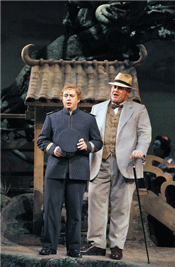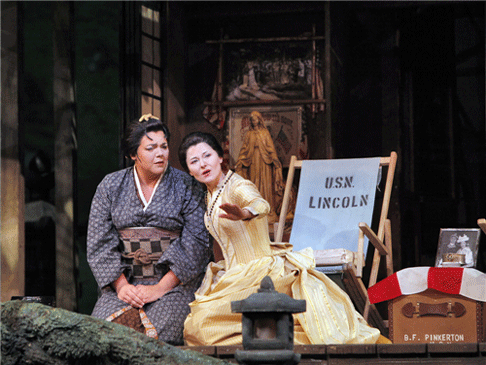![Svetla Vassileva as Cio-Cio-San [Photo by Cory Weaver courtesy of San Francisco Opera]](http://www.operatoday.com/Vas2email.gif)
24 Oct 2010
Madama Butterfly in San Francisco
“One of the most beautiful sets I have ever seen,” crows San Francisco Opera general director David Gockley over the airwaves, “directed by Broadway legend Hal Prince.”
English Touring Opera are delighted to announce a season of lyric monodramas to tour nationally from October to December. The season features music for solo singer and piano by Argento, Britten, Tippett and Shostakovich with a bold and inventive approach to making opera during social distancing.
This tenth of ten Live from London concerts was in fact a recorded live performance from California. It was no less enjoyable for that, and it was also uplifting to learn that this wasn’t in fact the ‘last’ LfL event that we will be able to enjoy, courtesy of VOCES8 and their fellow vocal ensembles (more below …).
Ever since Wigmore Hall announced their superb series of autumn concerts, all streamed live and available free of charge, I’d been looking forward to this song recital by Ian Bostridge and Imogen Cooper.
The Sixteen continues its exploration of Henry Purcell’s Welcome Songs for Charles II. As with Robert King’s pioneering Purcell series begun over thirty years ago for Hyperion, Harry Christophers is recording two Welcome Songs per disc.
Although Stile Antico’s programme article for their Live from London recital introduced their selection from the many treasures of the English Renaissance in the context of the theological debates and upheavals of the Tudor and Elizabethan years, their performance was more evocative of private chamber music than of public liturgy.
In February this year, Albanian soprano Ermonela Jaho made a highly lauded debut recital at Wigmore Hall - a concert which both celebrated Opera Rara’s 50th anniversary and honoured the career of the Italian soprano Rosina Storchio (1872-1945), the star of verismo who created the title roles in Leoncavallo’s La bohème and Zazà, Mascagni’s Lodoletta and Puccini’s Madama Butterfly.
Evidently, face masks don’t stifle appreciative “Bravo!”s. And, reducing audience numbers doesn’t lower the volume of such acclamations. For, the audience at Wigmore Hall gave soprano Elizabeth Llewellyn and pianist Simon Lepper a greatly deserved warm reception and hearty response following this lunchtime recital of late-Romantic song.
Collapsology. Or, perhaps we should use the French word ‘Collapsologie’ because this is a transdisciplinary idea pretty much advocated by a series of French theorists - and apparently, mostly French theorists. It in essence focuses on the imminent collapse of modern society and all its layers - a series of escalating crises on a global scale: environmental, economic, geopolitical, governmental; the list is extensive.
For this week’s Live from London vocal recital we moved from the home of VOCES8, St Anne and St Agnes in the City of London, to Kings Place, where The Sixteen - who have been associate artists at the venue for some time - presented a programme of music and words bound together by the theme of ‘reflection’.
'Such is your divine Disposation that both you excellently understand, and royally entertaine the Exercise of Musicke.’
Amongst an avalanche of new Mahler recordings appearing at the moment (Das Lied von der Erde seems to be the most favoured, with three) this 1991 Mahler Second from the 2nd Kassel MahlerFest is one of the more interesting releases.
‘And there was war in heaven: Michael and his angels fought against the dragon; and the dragon fought and his angels, And prevailed not; neither was their place found any more in heaven … that old serpent … Satan, which deceiveth the whole world: he was cast out into the earth, and his angels were cast out with him.’
If there is one myth, it seems believed by some people today, that probably needs shattering it is that post-war recordings or performances of Wagner operas were always of exceptional quality. This 1949 Hamburg Tristan und Isolde is one of those recordings - though quite who is to blame for its many problems takes quite some unearthing.
There was never any doubt that the fifth of the twelve Met Stars Live in Concert broadcasts was going to be a palpably intense and vivid event, as well as a musically stunning and theatrically enervating experience.
‘Love’ was the theme for this Live from London performance by Apollo5. Given the complexity and diversity of that human emotion, and Apollo5’s reputation for versatility and diverse repertoire, ranging from Renaissance choral music to jazz, from contemporary classical works to popular song, it was no surprise that their programme spanned 500 years and several musical styles.
The Academy of St Martin in the Fields have titled their autumn series of eight concerts - which are taking place at 5pm and 7.30pm on two Saturdays each month at their home venue in Trafalgar Square, and being filmed for streaming the following Thursday - ‘re:connect’.
The London Symphony Orchestra opened their Autumn 2020 season with a homage to Oliver Knussen, who died at the age of 66 in July 2018. The programme traced a national musical lineage through the twentieth century, from Britten to Knussen, on to Mark-Anthony Turnage, and entwining the LSO and Rattle too.
With the Live from London digital vocal festival entering the second half of the series, the festival’s host, VOCES8, returned to their home at St Annes and St Agnes in the City of London to present a sequence of ‘Choral Dances’ - vocal music inspired by dance, embracing diverse genres from the Renaissance madrigal to swing jazz.
Just a few unison string wriggles from the opening of Mozart’s overture to Le nozze di Figaro are enough to make any opera-lover perch on the edge of their seat, in excited anticipation of the drama in music to come, so there could be no other curtain-raiser for this Gala Concert at the Royal Opera House, the latest instalment from ‘their House’ to ‘our houses’.
"Before the ending of the day, creator of all things, we pray that, with your accustomed mercy, you may watch over us."
![Svetla Vassileva as Cio-Cio-San [Photo by Cory Weaver courtesy of San Francisco Opera]](http://www.operatoday.com/Vas2email.gif)
“One of the most beautiful sets I have ever seen,” crows San Francisco Opera general director David Gockley over the airwaves, “directed by Broadway legend Hal Prince.”
He is trying to sell twelve performances of Puccini’s masterpiece presumably to the unwashed hordes who flocked to to see Aida simulcast from the opera house onto the scoreboard of the local baseball stadium. The problem is once you have got them inside the War Memorial what do they see?
No doubt Hal Prince is a brilliant Broadway director. Soon after his opera exploits (Willie Stark in 1981 [more a Broadway musical than an opera], Madama Butterfly in 1982 and Turandot in 1983) he went on to direct Phantom of the Opera (1986), the longest running musical in history.
 Stefano Secco as Lt. B.F. Pinkerton) and Quinn Kelsey as Sharpless
Stefano Secco as Lt. B.F. Pinkerton) and Quinn Kelsey as Sharpless
Yes, this is the Madama Butterfly he staged for Lyric Opera of Chicago. It caused a lot of excitement back in 1982, after all those theatrically savvy Broadway folks know how to put on a show. There was a national telecast so the production is well known, but back then the lighting seemed far darker so it was harder to see the Kabuki theater knock-off Koken spin the set, and it is harder yet to recall the staging itself after these 28 years.
In San Francisco just now those ninja-like Koken (lithe figures in black body stockings) convincingly simulated the massive efforts needed to turn the huge, fairytale, Las Vegas worthy love nest of Pinkerton and Butterfly. They were quite apparent, forcing the same question that arose back then — what does hyper-stylized Kabuki theater have to do with verismo (realistic) opera?
The answer is about as much as Broadway has to do with verismo opera. The play Madame Butterfly on which Puccini based his opera is by San Francisco’s own David Belasco. It is the American equivalent of théâtre guignol or French horror theater, a frequent Puccini muse. In Belasco’s Butterfly Cho-Cho-San’s horrific suicide is carefully prepared within grubby circumstances. It is reality best experienced, if you must, from a seat in a theater.
Broadway is typically fast and easy. There is lots of stimulation created by frequent scenic movement and lots of color. The story is direct and emotions are obvious. Thus in the Prince Butterfly the set is spun and spun, the colors are seductive and glittery. Butterfly boldly sheds her kimono in favor of American apparel. But the bright gold of her bustled Victorian dress belied three years of wear and the condition of extreme poverty required by the story. It did have requisite Broadway flash.
 Daveda Karanas as Suzuki and Svetla Vassileva as Cio-Cio-San
Daveda Karanas as Suzuki and Svetla Vassileva as Cio-Cio-San
The Butterfly was the diminutive Svetla Vassileva, a veteran of the world’s big stages to be sure but also an artist of considerable depth, and one who is game for interesting contemporary productions. Her Butterfly is intrinsically Belasco’s geisha, physically and emotionally clumsy (after all she is fifteen years old), simple and very honest. She is not a geisha who makes it to Broadway.
Nevertheless the misplaced glitz of the production faded in her presence, leaving Mme. Vassileva alone on stage to carry Butterfly’s tragic burden, and that she did, to a degree. She is in fine voice — a young and healthy one — well schooled in verismo technique. She tirelessly delivered all the great scenes. The production betrayed her in its absence of reality, her lover seemed a confused kid who found himself in an opera production because he sings well. The balance of the casting showed blatant disregard for the needs of both Belasco and Broadway, and Puccini too wants heavier, Italianate voices. Even the genius of San Francisco Opera’s quixotic conductor Nicola Luisotti could not save the day, though he tried with a breathtaking coda.
But don’t just take my word for it. Check out the video excerpt on the San Francisco Opera website.
Michael Milenski